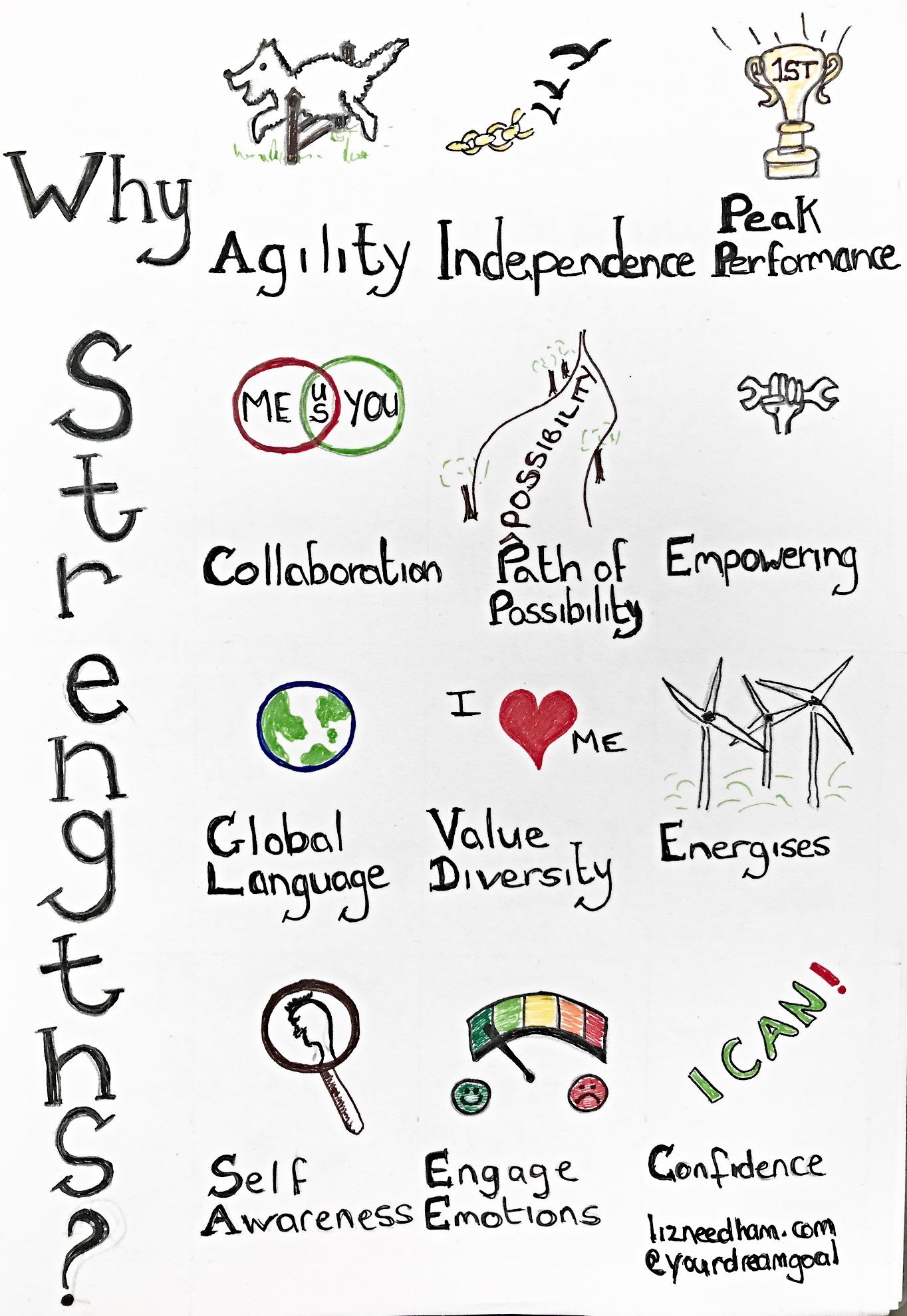I recently completed my Strengthscope® Practitioner Certification with a great group of coaches and organisational development specialists. The training was led by Co-Creation, an organisation which shares my values and approach to developing others. I came away feeling energised and reflecting on how long I’ve been using ‘strengths’ in my work with people and change.
There is a growing bank of evidence for strengths-based development and I’ve seen the impact it has had on my coaching clients. It’s not about ignoring development needs. In fact, they are often closely linked to strengths. However, the strengths based approach does focus consciously on the innate skills, strengths and preferences a person has. It makes sense that if you work on the things that give you energy and move you into a state of ‘flow’ you’re more likely to deliver great results.
I’ve seen strengths-based work bring senior leadership teams together to deliver in challenging circumstances, significantly improve people’s confidence when handling complex professional transitions and open up productive dialogue and collaboration between individuals experiencing conflict.
I first drew on the work of Marcus Buckingham and have since used strengths and achievements as an important part of my coaching work with clients. There are many models out there. Whilst Strengthscope® has brought a helpful framework into focus for me, any strengths-based approach can be really powerful if you are leading a team at any stage in its maturity.
So, my question is, if you lead or manage others, or you work with and through people
Are you focussing on people’s strengths and where they can add value first? Or do you see the gaps in performance and where people need to develop first?
I’ll be honest, I can recall times when I carried the ‘deficit mindset’ and I know I missed out on some great talent because of that. I was too firm in my ideas about what needed to be done and how. I didn’t always dig beneath the surface to understand how we could all have dealt with challenges more effectively. At the time I was unaware of how do this or what to do, I just felt a great pressure to deliver the work expected from me and my team.
At the CIPD NAP Conference in York in June I attended a session by Rob Baker on job crafting. The core principle is about fitting the role to the person and allowing more flexibility to achieve better results. This is the other side of the same coin for me. It’s about being curious about what skills and experience people have, about how people work and when they are at their best. As a manager and leader the challenge is how you can understand, experiment with and combine these factors to get an ever expanding set of demands met.
I set up my business to help managers and leaders at all levels to perform more effectively and in turn to help organisations to improve, grow and flourish. I believe that focussing on strengths can play a key role in that and here’s my 12 reasons why leaders and managers should focus more on strengths (and they are not all soft and fluffy!)
1. Agility – understanding everyone’s strengths helps you to be responsive and manage change.
2. Independence – optimising strengths makes individuals less reliant on their managers and others for continuous problem solving and direction.
3. Performance – Analysis of over 9,000 employees in 135 organisations found that focussing on personality and performance strengths has one of the strongest impacts on employee performance of all line manager actions (Harter and Schmidt, 2002).
4. Teamwork and collaboration – identifying everyone’s strengths and how the collective can deliver goals brings a greater appreciation of each individual.
5. Path of possibility – this Strengthscope® phrase captures the opening up of options and choices about ‘what could be’ rather than closing down possibilities and conversations.
6. Empowerment – using your strengths empowers you to shape how you do something as well as what you do, and when.
7. Global language – there is no need to translate strengths. Strengthscope® describe it as “what you and others think you are good at and what energises you when you spend time on it”.
8. Value diversity – this is at the heart of strengths work. Everyone has different strengths and no one is great at everything or enjoys everything. This is acknowledged and celebrated.
9. Energy – so important in today’s work environment. Strengths help individuals to focus on where they have most energy, resulting in more discretionary effort.
10. Self-awareness – understanding your strengths, how you developed them, how much you use them and how they can help with your next challenge are valuable insights.
11. Emotional engagement – strengths engage your emotions as well as your head because they are closely linked to your achievements, personality and values. If you’re working to your strengths you’re more emotionally engaged too.
12. Confidence – being recognised for and able to focus on your strengths will increase your professional confidence.
So, ask yourself
Is your whole team working to its strengths?
If not you’re probably not performing at your optimum.
I’ve included a poster to remind you why you should focus on strengths as a leader and manager of others. In future articles I will focus on where managers can start if they are interested in the ‘how?’ of using strengths.
Until then I’d love to hear about your experiences of using strengths or any questions you have. If you’d like to know more about integrating strengths-based work into your team please get in touch.
